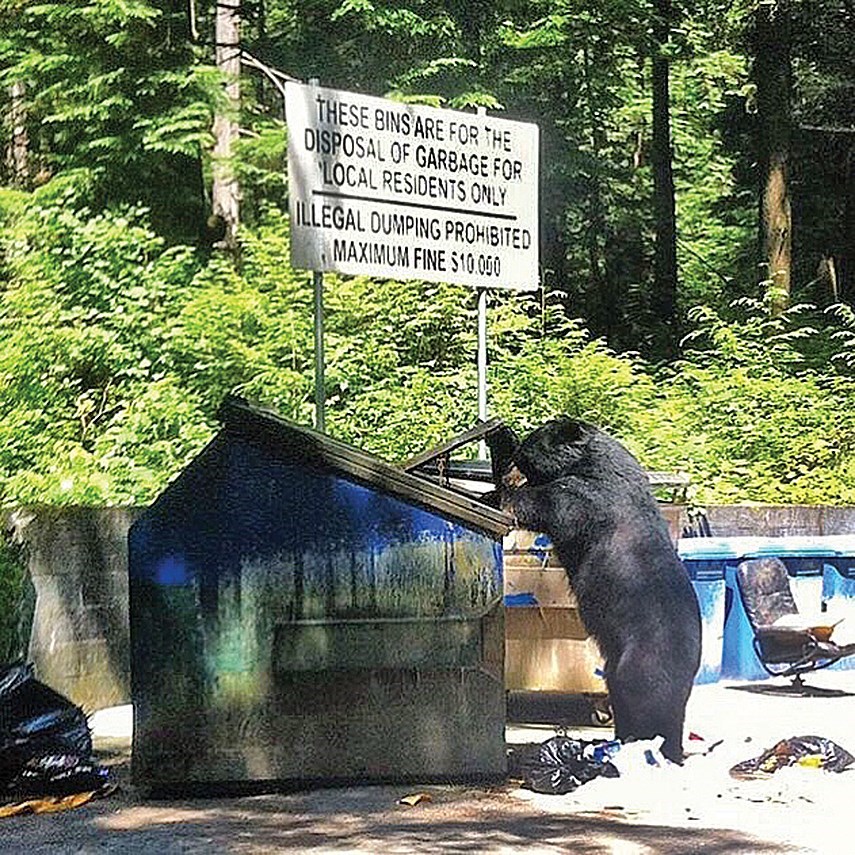Port Coquitlam remains a hot spot for bears and one was recently spotted dumpster diving for food near a local business.
Sgt. Todd Hunter of the BC Conservation Officer Service has confirmed that at least two businesses have been slapped with Wildlife Protection Orders — one earlier this week, after an employee spotted a bear in a dumpster.
Industrial food waste that attracts bears has been a concern in the city, Hunter said, and conservation officers are working with local businesses and city bylaw officers to deal with the problem.
Hunter said conservation officers were called to a business on Sunday night after a report that a worker found a bear in a dumpster.
By the time officers arrived, the bear had jumped out of the bin but the bear was spotted nearby looking for food waste in someone's yard.
Hunter said he hazed it out of the area, but it might still come back if food is available.
"We were working with that business to make sure that thing is locked up," Hunter said.
While bears might be expected to return to dens for a period of hibernation, also called torpor, that doesn't appear to be the case in Port Coquitlam, where several bears have been spotted in neighbourhoods on the north side of the city.
Hunter said while on his way to the dumpster-diving call he saw three bears making for homes near Fremont Street and Prairie Avenue.
He got out of his car and yelled at them to discourage them from entering neighbourhoods but Hunter said he's worried the bears will look for accessible green bins and won't bed down for the winter if they can get easy access to human food waste and other attractants.
"We want to prevent that at all costs, and have them naturally finding their way, hopefully we can encourage that by promoting good practices," Hunter said.
A number of people have been reporting bear sightings in Port Coquitlam in recent days, including one man on the Port Coquitlam Community Facebook group who posted a photo of a bear gaining access to someone's green bin.
Hunter said bears can still sometimes get bins open, even when clips and an extra metal band is used to seal them. "It just takes them longer."
If possible, he encourages people to use additional methods to deter bears, including putting the bins in a locked enclosure.
Freezing food scraps before putting them out for collection is another suggestion.
This fall has been busy for bears in the Tri-Cities, and Hunter suspects bears come down the mountains to get berries and salmon and will move into neighbourhoods when natural food becomes scarce.
However, fewer bears have been destroyed this year, compared to last year — nine compared to 13 in 2020 — and four bears were relocated.
But there are still several months to go until the reporting period ends, March 31, 2022.
Hunter credits the cities and local groups such as Tri-Cities Bear Aware for raising awareness about the importance of removing attractants so bears don't linger in neighbourhoods.
"In the grand scheme of things, there’s a lot of work being done behind the scenes, If we didn’t have those awesome people in our non-government organizations or the municipalities trying to achieve some results, If we didn't have that, we'd be in a different situation.
Wildlife calls to date:
- Coquitlam: 1,195 wildlife complaints (1,066 involve a black bear)
- Port Coquitlam: 722 wildlife complaints (670 involve a black bear)
- Port Moody: 322 wildlife complaints (300 involve a black bear)





